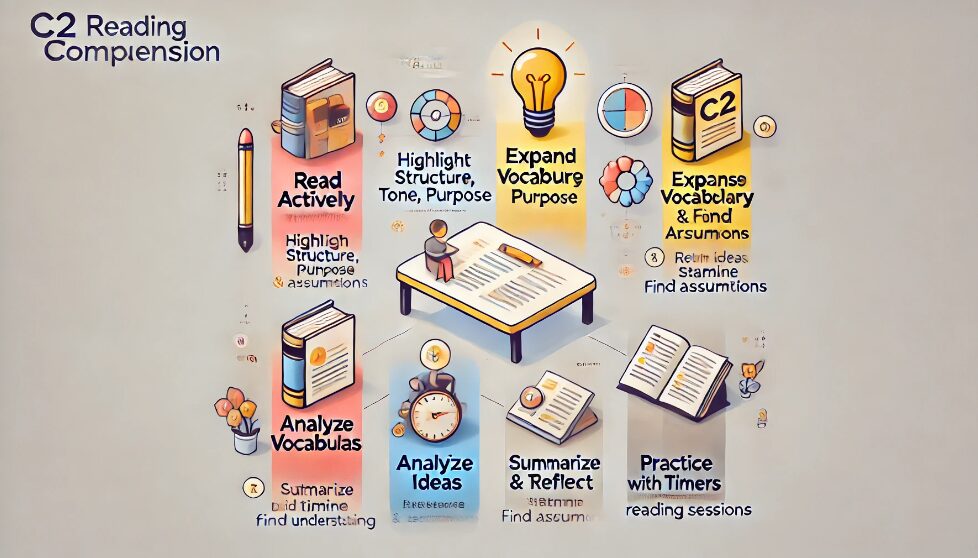What Is C2 Reading Comprehension?
C2 Reading comprehension means more than just understanding words — it’s the ability to analyze, interpret, and evaluate what you read. At the C2 level (Proficient User – CEFR), this includes:
- Understanding complex texts with subtle meaning
- Recognizing tone, bias, irony, and structure
- Identifying the author’s purpose and perspective
- Making inferences and connecting abstract ideas
Reading at this level is comparable to native-level academic or professional reading.

Who Needs C2 Reading Comprehension Skills?
This level of reading is ideal for:
✅ IELTS 8.0+ / TOEFL 110+ / CPE Exam Takers
✅ Academics and Researchers
✅ Professionals using English in global workplaces
✅ Advanced learners pursuing near-native fluency
What’s your English level?
Discover your level now: A1/A2/B1/B2/C1/C2 and GET your certificate!
🧠 How to Improve C2-Level Reading Skills
Here are top strategies to improve your C2 reading comprehension:
| Strategy | Description |
|---|---|
| 📚 Read Advanced Materials | Use sources like The Economist, BBC Future, academic papers, and essays. |
| ✍️ Summarize & Paraphrase | Rewrite paragraphs in your own words to process ideas deeply. |
| 🧩 Analyze Structure | Identify main ideas, supporting details, comparisons, and contrasts. |
| 🔍 Watch for Implicit Meaning | Practice recognizing sarcasm, irony, assumptions, and bias. |
| 🕒 Take Timed Practice Tests | Develop your speed and comprehension under pressure. |
C2 Reading Comprehension Sample Test (10 Questions)
Passage 1 – The Power of Language
“Language is not merely a tool for communication; it is the architecture of thought. The limitations of one’s language can shape or constrain how reality is perceived. Philosophers like Wittgenstein argued that ‘the limits of my language mean the limits of my world.’ Expanding vocabulary is not just about fluency, but about expanding mental horizons.”
1. What’s the main idea of the passage?
A) Vocabulary improves grammar
B) Language shapes thought
C) All languages are equal
D) Speaking is more important than reading
2. What does the quote imply?
A) Language defines thought
B) Grammar is difficult
C) Reading helps memory
D) Speaking is the goal
3. The tone of the passage is:
A) Humorous
B) Philosophical
C) Aggressive
D) Casual
Passage 2 – Artificial Intelligence and Ethics
“As AI grows, so do ethical concerns. From hiring algorithms to autonomous weapons, AI’s role in high-stakes decisions reveals serious flaws in oversight. While some praise AI’s efficiency, its opacity and lack of accountability may worsen inequality.”
4. What is the main concern about AI?
A) It’s too fast
B) It can be unfair
C) It helps jobs
D) It is free to use
5. “Opacity” in this context means:
A) Simplicity
B) Lack of understanding
C) Brightness
D) Neutrality
6. What is the author’s attitude?
A) Supportive
B) Indifferent
C) Cautiously critical
D) Confused
Passage 3 – Creativity and Originality
“In a content-rich world, originality is harder to find. Many ‘new’ ideas are old ones in disguise. Creativity isn’t sudden genius but a mix of experience, exposure, and persistence.”
7. What’s the author’s view on creativity?
A) It comes from copying
B) It’s born in isolation
C) It grows with experience
D) It is easy to achieve
8. What does “myth of the solitary genius” imply?
A) Creativity is a team effort
B) Only geniuses are creative
C) Writing is personal
D) Reading improves genius
9. The word “elusive” most likely means:
A) Dangerous
B) Hard to find
C) Popular
D) Loud
10. What theme connects all three texts?
A) Imagination
B) Technology in education
C) The importance of questioning assumptions
D) Travel and discovery
✅ Answer Key:
- B
- A
- B
- B
- B
- C
- C
- A
- B
- C





